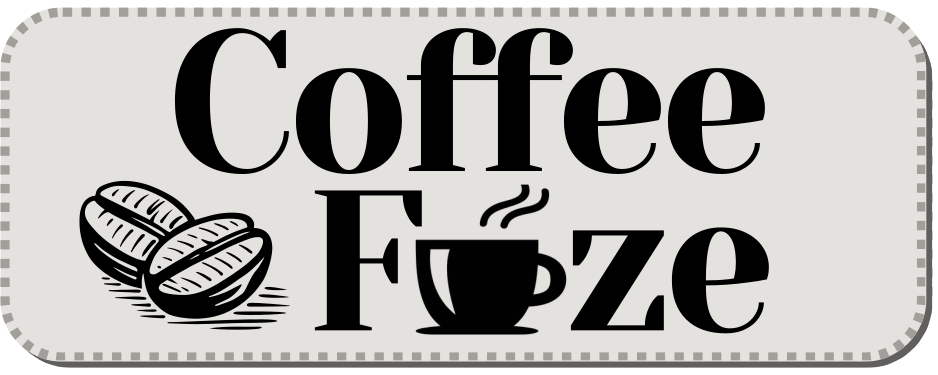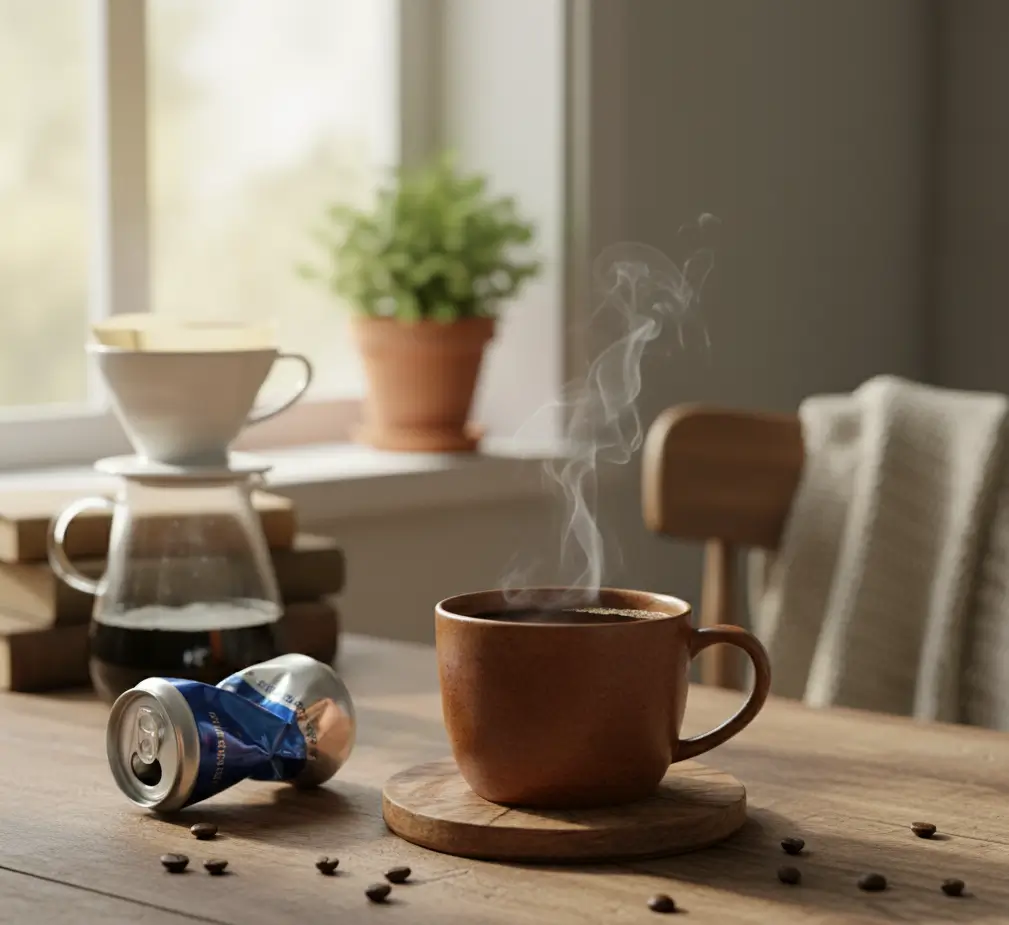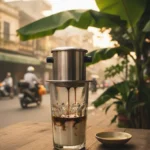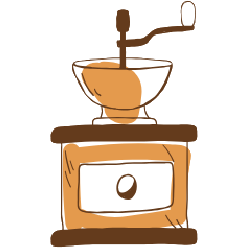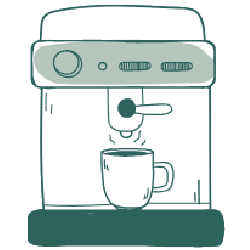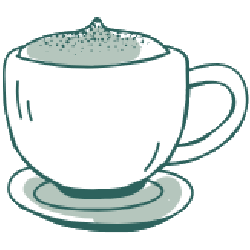You’re probably looking for an energy boost, right? We all are. Most of us grab either coffee or an energy drink. Both give you that instant jolt, but they hit your body very differently. I’m going to show you exactly why coffee is generally better than energy drinks for your health. We’ll look at what’s inside them, how they stack up nutritionally, and what they do to you long-term.
- What’s actually in coffee and energy drinks, and how do they differ nutritionally?
- What happens to your health long-term if you drink coffee or energy drinks?
- What are the risks and side effects?
- Why do regulations and labels matter for these drinks?
- When should you choose coffee for your daily energy?
- Why is coffee better than energy drinks for your overall health?
What’s actually in coffee and energy drinks, and how do they differ nutritionally?
When you look closely at coffee and energy drinks, you’ll see they have totally different chemical and nutritional makeup. The main things to consider are where their caffeine comes from, what other stuff gets added, and their overall nutritional value.
Where does the caffeine come from?
The caffeine in these drinks comes from very different places. Coffee gets its caffeine naturally from roasted coffee beans. This natural source usually gives you a smooth, steady energy lift, so you avoid those sudden jitters or awful crashes.
Energy drinks, on the other hand, usually contain synthetic caffeine, which is made in a lab. This artificial caffeine often leads to really sudden energy spikes, followed by even quicker crashes. It’s not a very stable energy ride at all.
What other stuff do energy drinks add that coffee doesn’t?
Energy drinks often pack in a bunch of extra ingredients you won’t find in your average cup of coffee. They usually contain:
- Other stimulants like taurine, guarana, and ginseng. Mix those with a lot of caffeine, and you’ve got a pretty powerful stimulant cocktail,
- Preservatives and artificial flavors to make them taste better and last longer.
Coffee is much simpler. You typically won’t find those synthetic additives in it.
Sugar, vitamins, and calories: The nutritional difference
Nutritionally, these drinks are worlds apart, especially when it comes to sugar and calories. Energy drinks are famous for being loaded with sugar – often around 40 grams in just one serving. That much sugar adds a ton of calories, just like many sodas do, and it really affects your metabolic health.
Now, coffee usually has very few calories and no sugar at all, unless you add it yourself. While some energy drinks might toss in some B vitamins, coffee naturally gives you good stuff like antioxidants and essential vitamins such as niacin and riboflavin. It offers real health perks beyond just the caffeine.
What happens to your health long-term if you drink coffee or energy drinks?
Drinking coffee or energy drinks over a long time has completely different effects on your health. Knowing these differences helps you make smarter choices about how you get your daily energy.
| Aspect | Coffee | Energy Drinks |
|---|---|---|
| Heart Health | Associated with improved Cardiovascular Health and reduced risk of cardiovascular disease—especially at 3–5 cups/day. | Linked to increased heart rate, blood pressure, and higher cardiovascular risk, especially in those with pre-existing conditions. |
| Metabolic Health | Lower risk of Type 2 Diabetes; may help with Weight Management (if consumed black). | High sugar content increases risk of Obesity, Type 2 Diabetes, and Dental Problems. |
| Mental Health | May lower risk of Depression and Suicide; chronic use can increase Anxiety in some individuals. | Associated with increased risk of anxiety, Mood Swings, and Suicidal Thoughts, especially at higher consumption. |
| Bone Health | Excessive intake (>600 mg/day) may reduce Bone Density. | Not specifically reported, but high sugar/caffeine may contribute to similar risks. |
| Sleep | Can cause Insomnia if consumed in large amounts or late in the day. | Similar sleep disruption risks due to caffeine, exacerbated by sugar crashes. |
| Hydration | Moderate amounts do not dehydrate; supports Hydration. | High caffeine and sugar can contribute to Dehydration. |
Over the long haul, coffee comes out ahead. Its natural compounds support heart and metabolic health and a steadier mood—without the sugar spikes and additive overload you get from many energy drinks. Find out more about health benefits of coffee and the right amount is recommended to drink per day.
How do they affect your heart?
Coffee and energy drinks impact your heart in different ways. Drinking a moderate amount of coffee, usually 3 to 5 cups a day, links to better cardiovascular health. It can even lower your risk of heart disease if you’re generally healthy.
Energy drinks, though, pretty regularly lead to bad heart effects. They can make your heart rate jump and your blood pressure rise. This means a higher risk for your heart, especially if you already have heart problems.
What about your metabolic health?
Coffee and energy drinks also have very different effects on your metabolic health. Black coffee, for example, connects to a lower risk of Type 2 Diabetes and can even help with weight management. Its natural compounds might improve how your body uses insulin and speed up your metabolism.
Energy drinks, however, with their incredibly high sugar content, hit your metabolic health hard. Drinking them regularly really increases your risk of obesity, Type 2 Diabetes, and, no surprise, contributes to serious dental problems because of all that sugar.
How do they affect your mental health?
The mental effects of these drinks also vary a lot. Coffee might actually protect your mental health, potentially lowering your risk of depression and even suicide. Many people find it genuinely boosts their mood.
Just be careful not to overdo it, as too much coffee can make some sensitive people feel more anxious. Energy drinks, though, especially with all their stimulants and sugar, are really linked to higher anxiety, mood swings, and even suicidal thoughts. This can happen even if you don’t drink a lot of them, seriously affecting your overall well-being.
Bone health, sleep, and hydration: What you need to know
Let’s look at a few other important health areas these drinks touch:
- For your bone health, drinking too much coffee – more than 600 mg of caffeine daily – could slowly reduce your bone density over time. We don’t have as much research on energy drinks here, but their high sugar and caffeine levels could definitely pose similar bone risks,
- Both coffee and energy drinks can cause insomnia and mess with your sleep if you have too much or drink them late. But energy drinks might make sleep problems worse because of those sugar crashes,
- As for hydration, a moderate amount of coffee usually doesn’t dehydrate you; it actually helps with your daily fluid intake. On the flip side, the high caffeine and sugar in energy drinks can make you feel actively dehydrated.
What are the risks and side effects?
The side effects and risks you face with coffee versus energy drinks really depend on what’s in them and how much. You should know these differences to make smart, healthy choices.
Caffeine levels: How much kick do you get?
Caffeine levels and how potent they are differ a lot between these two types of drinks. Energy drinks often contain much higher caffeine levels – usually 100-200 mg or even more in just one serving. That means you can easily go over the daily recommended caffeine limit with only one or two cans.
Coffee’s caffeine content varies based on how it’s brewed, the beans, and serving size, but it’s generally moderate and well-understood. A typical cup of coffee has about 80-100 mg of caffeine, which makes it much easier to keep your intake in check.
The danger of combined stimulants and sugar in energy drinks
Energy drinks carry bigger risks because of how their ingredients work together. When you mix a lot of caffeine, tons of sugar, and added stimulants like taurine and guarana, it really amps up the stimulant effect in your body. This powerful blend can cause serious health problems, like high blood pressure, irregular heartbeats, and for some sensitive people, even cardiac arrest.
Coffee, even with its caffeine, generally poses fewer serious risks for healthy people. It’s a simpler drink and doesn’t have that multiplying stimulant effect you see in energy drinks.
Special considerations for teens and vulnerable people
Some groups of people face higher risks from these drinks. We really discourage energy drinks for teens and children because of all their caffeine and sugar. Drinking them can lead to dependence, jitters, heart problems, and even behavioral issues in this vulnerable age group.
Moderate coffee for teens is safer than energy drinks, but experts still say to keep it limited. If you have existing heart conditions, if you’re pregnant, or if you’re just very sensitive to stimulants, you’re also at a much higher risk from energy drinks because of their intense ingredients.
Why do regulations and labels matter for these drinks?
Regulations and how drinks are labeled are super important for knowing what’s actually in your coffee and energy drinks and if they’re safe. The rules for these two beverages are quite different, and that affects how transparent they are and what you, as a consumer, actually know.
Why different rules for different drinks?
The different rules exist mostly because health authorities classify each drink differently. Coffee usually falls under standard FDA Food Regulation as a conventional food or beverage. It has regular food labeling requirements, but you won’t see a mandatory caffeine amount on the label because the caffeine is natural.
Energy drinks, though, can be classified in two ways: as conventional foods or, and this is important, as liquid dietary supplements. This classification changes everything about how they’re regulated, which means very different oversight for these products.
The “dietary supplement” loophole
Many energy drinks actually use a “dietary supplement” loophole by selling themselves as liquid dietary supplements. This puts them under the Dietary Supplement Health and Education Act of 1994 (DSHEA). Here’s the kicker: the FDA sets no caffeine limit for dietary supplements under DSHEA. This means manufacturers can load them with way more caffeine than you’d ever find in a regular beverage.
Energy drink labels might list caffeine or warnings, but they don’t always have to by law. This is a big difference from the stricter, legally enforced rules of the Nutrition Labeling and Education Act (NLEA) for regular foods, which require specific nutrition facts. That act gives you much clearer ingredient transparency.
When should you choose coffee for your daily energy?
If you’re looking for steady energy, real health benefits, and a cleaner list of ingredients, then a moderate black coffee is usually the smarter pick. Coffee offers natural stimulants without all the artificial additives and crazy amounts of sugar you find in energy drinks. That makes it a better choice for your overall well-being and long-term health.
Sure, energy drinks might have a very rare place – maybe in an emergency or during extreme physical effort, with careful monitoring. But I can’t stress enough the serious health risks if you drink them regularly. Choosing coffee means picking a drink with a long history of well-researched health benefits and a much more predictable effect on your body. Go for moderation and make informed choices about your daily energy.
Why is coffee better than energy drinks for your overall health?
Coffee is generally better than energy drinks for your overall health. It uses natural ingredients, has fewer additives, and gives you a much better long-term health outlook. Drink it black, and you get lower sugar and calorie content, making it a healthier way to get sustained energy without all those extra energy drink risks.
The good things moderate coffee can do for your cardiovascular, metabolic, and mental health definitely outweigh the possible bad stuff from energy drinks. Both have caffeine, and you need to be moderate with both, but coffee is simply a safer, more beneficial way to boost your energy. So, next time you need a pick-me-up, grab a cup of coffee. Your body will probably thank you.
